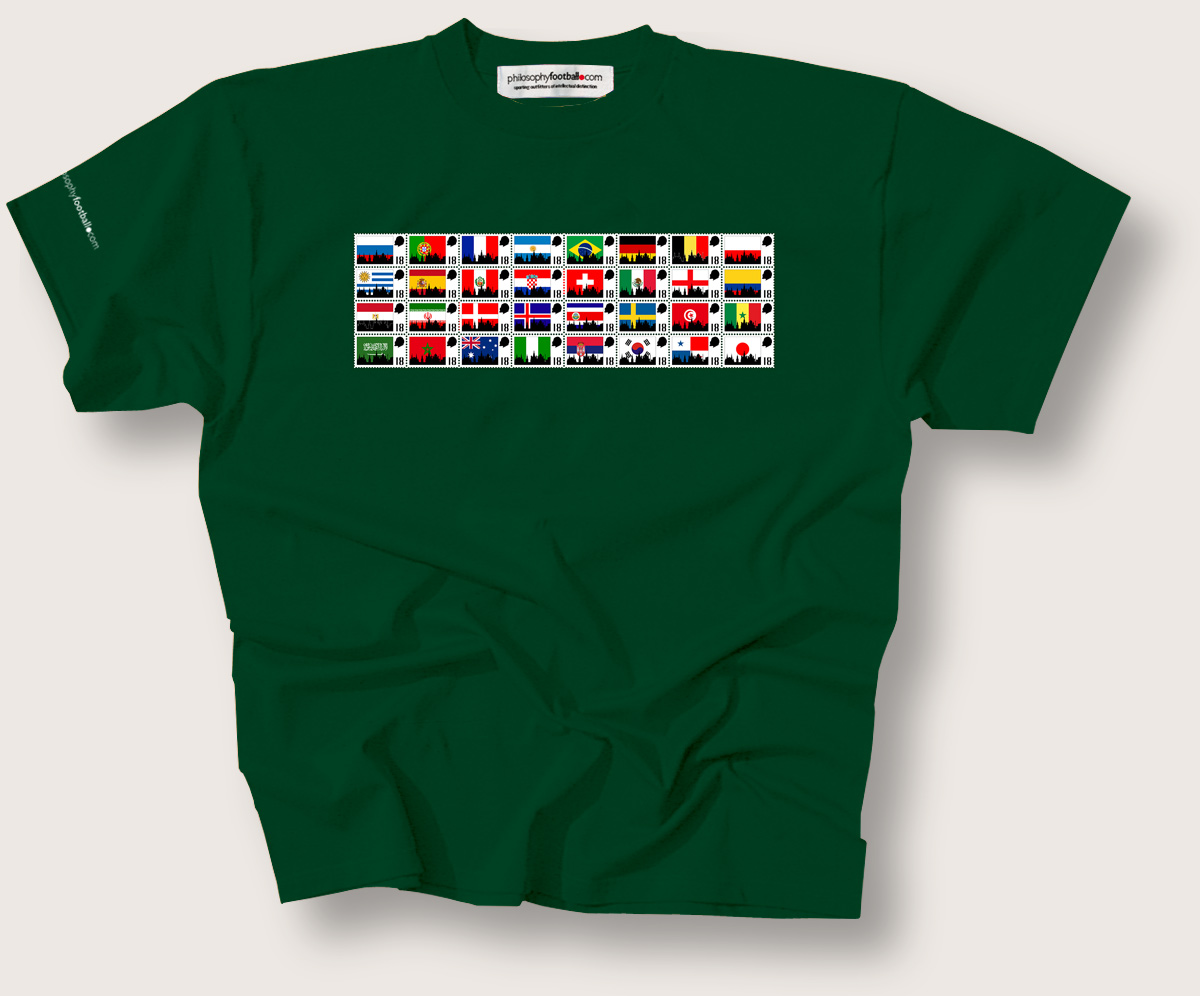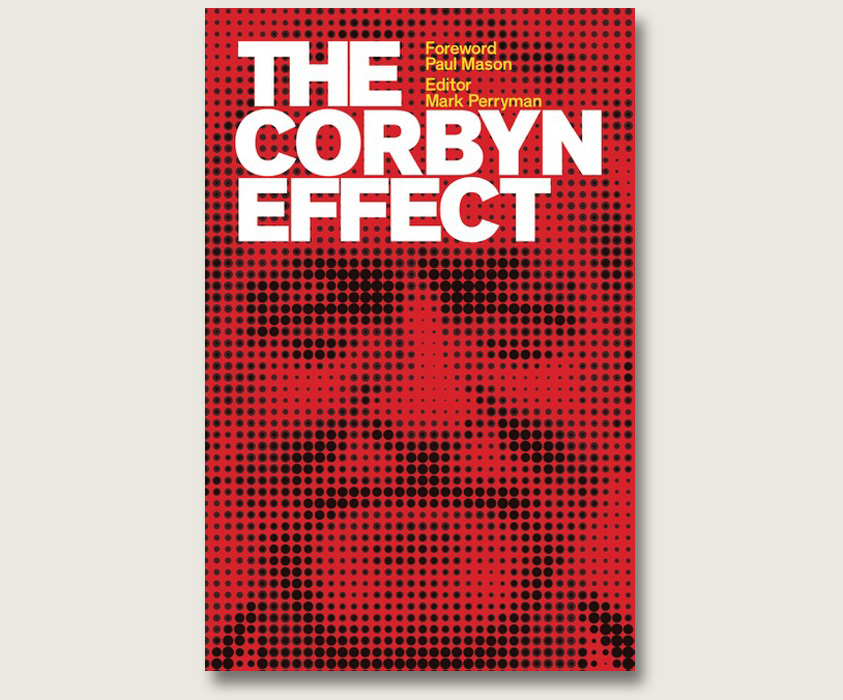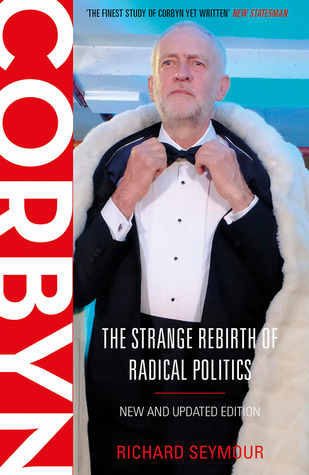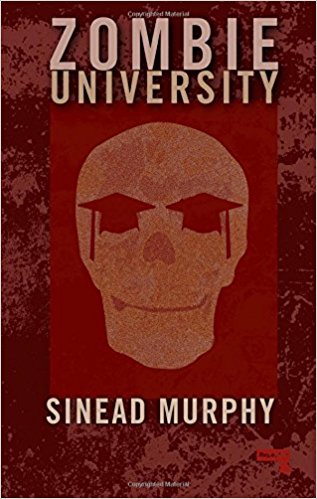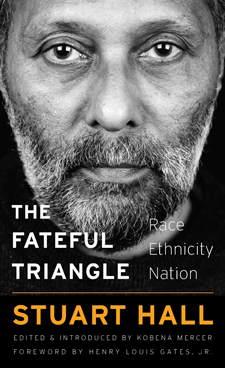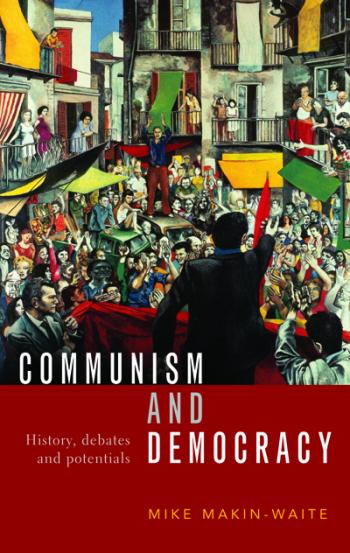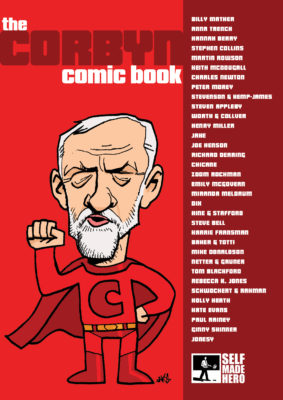
England Expects
03.07.18
As England prepare to take on Colombia tonight Philosophy Football’s Mark Perryman outlines what we might or might not, be able to look forward to.
Illustration : Hugh Tisdale, Philosophy Football
The last time England got to this stage at a World Cup there was no happy ending. A 4-1 thrashing at the hands of Germany at South Africa 2010. Well at least we know that isn’t going to happen, Auf Wiedershenbefore the postcards, ouch!
Though it might do not to be too cocky. England have a decent record in the last sixteen round when not up against a top tier football nation. Beating Ecuador at World Cup 2006, Denmark in 2002, Belgium in 1990, Paraguay in 1986. But out of that lot the only time we then made it past the quarters to the semis was when at Italia’90 after beating Belgium in the last 16 we faced Cameroon, rather than a higher ranked team.
This is what makes the Russia 2018 campaign so mouth-watering a prospect. Beat Colombia and the quarter will be against Sweden or Switzerland. And with Spain dispatched England’s semi-final opponent would be Russia or Croatia. Arguably there has never been a World Cup like it for sending well-fancied former tournament winners home early, Germany now joined by the last sixteen exits of Argentina, Spain, and reigning European champions, Portugal.
But again, don’t lets go getting ahead of ourselves. Since England’s last World Cup semi-final appearance 28 years ago non top-tier football nations; Bulgaria, Sweden, Croatia, Turkey, South Korea, Portugal, those that have never won the World Cup or played in a final, have made it this far. England’s world standing never moved on after 1990. In these intervening almost three decades, we fell behind others and in the recent past have slipped back still further. Thus, Colombia, Sweden or Switzerland, Croatia or Russia can’t be taken as lightly as some might assume.
All those fancied teams going home early has opened up the tournament but something else has happened too. No African team made it into the last 16. Pelé’s prediction that an African team would win the World Cup by 2000 looks as far away as ever. And with only Japan making it through to the last sixteen, despite their plucky performance against Belgium, their eventual defeat means the same goes for Asia too. Football is a truly global game but the very top level remains a European-Latin American cartel with little obvious sign of that changing. World Cups have been won, since its inception, by a remarkably small number of teams. Apart from Brazil, Germany and Italy plus Uruguay’s rather ancient 1930 and 1950 tournament wins following England’s one and only triumph, newcomers Argentina have won the trophy twice, in 1978 and ’86. Three tournaments later host nation France lifted the trophy for the first and only time in ‘98, and another three tournaments later Spain did the same in 2010 but not again since. After the exits of Germany and Argentina, the failure of either four times winners Italy to qualify or Holland, who hold the unenviable record of making the most appearances in a World Cup Final without winning it, the best possible outcome from Russia 2018 would be for a nation that’s never won the World Cup to lift the trophy, or England, of course.
World Cup winners may be more or less unchanging yet something else has changed, for European teams in particular. When England won the World Cup in 1966 the team was all-white. 24 years later and the team that lined up once again to face West Germany in the ’90 semi-final included just two black players, Des Walker and Paul Parker. Another 28 years on and of the England team to face Columbia tonight more than half the line-up will be black or mixed race . Something when it happened at World Cup 2002 for the first time seemed so natural a development it barely merited a mention. And what is true of England, the same more or less goes for France, Belgium, Switzerland, Germany and Portugal too, teams made up of a patchwork of a nation’s migrant communities .
Of course the meaning and effect of all this can be overstated. At France ’98 Zinedine Zidane led arguably the greatest multicultural team of all to World Cup triumph and two years later the same at Euro 2000. But in 2002 Jean Marie Le Pen makes it into the final round of the French Presidential Election for the first time ever, polling almost 20% of the vote. And in 2017 Marine Le Pen achieved the same, this time attracting a third of the popular vote. But the point is that a St George Cross draped in the colours of multiculturalism has at least the potential for the beginnings of a journey away from racism. It has a reach and symbolism like no other, touching the parts of a nation’s soul no anti-racist placard thrust in our faces is ever going to This is the meaning of modern football and when England begin to scale the heights of 2018 World Cup ambition the reach of that message is amplified still further on a scale and in a manner that ’66 could never have done, and ’90 barely began. A popular Left politics must surely connect with such episodes as metaphor, to translate what we see on the pitch into the changes beyond the touchline we require to become a more equal society. So here’s my maxim for Jeremy Corbyn and his colleagues. If Labour cannot explain the meaning of the World Cup why should I listen to what the party has to tell me on how they’re going to fix the mess the NHS is in? Not the flimsy populism of Blair when he adopted the ‘Labour’s Coming Home’ message after England’s last tournament semi, Euro ‘96, but a political practice rooted in popular culture because here, more than anywhere else, ideas are not only formed, but also changed.
Mark Perryman is the co-founder of Philosophy Football, self-styled ‘sporting outfitters of intellectual distinction’. TheirEngland Expects T-shirt is available from here
If a week is a long time in
22.06.18
As England prepare to take on Panama Philosophy Football’sMark Perryman draws some lessons from the first week of World Cup 2018
Image : Hugh Tisdale
It’s a well-worn footballing cliché that you can only beat the team in front of you. But England taking until the 91st minute to secure victory over Tunisia doesn’t look good. Nevertheless, with three points in the bag, and a widely-expected second victory against Panama on Sunday, England’s last 16 qualification might – might - have been secured by Monday, in which case, given the likely opponents of Senegal, Japan or Poland in the next round, thoughts will inevitably turn to a possible quarter-final.
Without doubt this is English progress, of sorts, but let’s not get ahead of ourselves. Our natural status is beaten quarter-finalists. Prior to that golden day in ’66 it was the best we’d ever done, and we’ve only bettered this once since, at Italia ’90 all of 28 years ago. Sven was the last England manager to get us to a quarter-final, at World Cups 2002 and 2006 (as well as at Euro 2004 in between). If we make it this time Gareth Southgate will have got us back to where we belong, amongst the top 8 World Cup nations, but probably still a long way short of being among the top 4. It was ever thus.
Thankfully the games are all being played out against the backdrop of a happy clappy Ros! Si! Ya! , despite the build-up full of dire predictions of heavy-handed policing, neo-Nazi hooligan gangs, racist attacks, homophobia and the grimmest environment imaginable. The build-up was the same for South Africa’s World Cup 2010. Muggings, car-jacking, and a race war was what travelling fans were promised. Nothing of the sort materialised. And again for Brazil 2014, political unrest combined with Faveladrug gangs was predicted to ruin the World Cup for the supporters. Once again, no such incidents occurred.
But before you know it, England will be preparing to head home, and the same lazy predications about the host nation will be being rolled out for next time.
And we’ll also have the same curious phenomenon that when the matches kick off we go from one extreme, destination hellhole, to another, football paradise.
The truth is Russia does have problems; an authoritarian regime, Greater Russian nationalism, massive inequalities of wealth distribution, racism, homophobia and a violent fan sub-culture. None of these were ever going to be allowed to ruin a World Cup which is Russia’s unmatchable opportunity to showcase the best of its nation to the world. And none of them have gone away either just because a game of football is underway. As with an England win, against Tunisia, the whistle blows and all sense of perspective is booted out of the window.
We already know it will be Qatar hosting the tournament in 2022, followed by the successful joint bid of USA, Canada and Mexico for 2026. And England is apparently considering a joint British bid for 2030 with the Scots and Welsh FAs, which will face competition from the Uruguay, Argentina, Paraguay joint bid, and no doubt others. These tri-nation hosts are a result of the World Cup’s expansion from the current 32 team format to a gargantuan 48.
The global reach of football is continuing so some kind of increase is justified, as it was when the tournament grew first from 16 to 24 nations for Spain ‘82, then again to 32 for France ‘98 and the same since then. But 48 is too big a jump. It creates too massive a tournament, too many games (many of which will be meaningless), and too big a disparity in ability. 40 would have been a much better compromise, 8 groups of 5 rather than the current 8 groups of 4, a step-up of 8 teams as every previous expansion has been. Oh – and with all the extra places awarded to the under-represented continents, aka anywhere but Europe and South America (sorry Scotland!).
A more modest increase in competitor nations would also preserve the feasibility of single host nations. Every previous one has helped define how a World Cup is consumed and remembered almost as much as the football on the pitch and the eventual winner. The one exception, when Japan and South Korea jointly hosted World Cup 2002 just about worked, thanks to the extraordinary success of the Korean team and their Red Army of supporters as they reached the semis, though Japan largely defined the consumption of the football and Brazil’s eventual victory in the Tokyo final.
Here’s an idea. 2030 is the centenary World Cup. The first one took place in Uruguay and England, like most of the other European nations, shamefully chose to boycott it because South America was too far away and the footballing world revolves around Europe, or in England’s case, ourselves.
So why not award hosting 2030 now to Uruguay, and abandon the expensive and corruptible bidding process? The world of football could give every assistance to this one small nation to host it. It could organise it as a celebration of one hundred years’ worth of the growing international appeal of our game, the people’s game. It could fly in the face of all that FIFA has become.
Well - like an England semi (even my optimism of the will has its limits) we’re allowed our World Cup dreams, aren’t we?
Mark Perryman is the co-founder of Philosophy Football our England World Cup T-shirt is available from here
Thirty-two nations under a groove
14.06.18
Will the World Cup be an orgy of petty-minded nationalism? Philosophy Football’s Mark Perryman doesn’t seem to think so.
Design : Hugh Tisdale
In between the matches from Russia over the next few weeks here’s a trivial pursuit question to test mates’ footballing knowledge. Which is the only World Cup squad with the entire list of players playing in their own country’s domestic league. Easy! Easy! England, of course, except it’s not just a knowledge of football that provides the answer but politics, history and culture too.
First, the domesticity of our players betrays a certain very English parochialism . More comfortable at home than abroad, Europe after all is a foreign country.
Secondly, the political economy of the game, aka English clubs apart pay heaps more dosh than most overseas outfits.
Thirdly, Anglo-superiority complex. Who in England’s 2018 squad would make it as a certain first team starter at a top German, Italian or Spanish club? Precious few, there’s a number who aren’t even regular starters at their own clubs, edged out by Johnny Foreigner’s talent.
More than anything else it is political economy which helps explains this.
England’s second most successful World Cup campaign remains Italia ’90. Of England’s starting line-up Lineker had played in Spain, for Barcelona, Waddle was then playing for Marseille in France. Gazza, Des Walker and Platt all went on to play for Italian clubs. And this was by no means unusual. And as for the victorious West Germany side who went on to win the trophy none of them played in England though Klinsmann would end up being snapped up by an English side but that was 4 years hence in ‘94.
The lesson that was drawn from Italia ’90 was that English football had the potential to recover its reputation and popularity post the banning of our club sides from European competition post-Heysel and the human tragedy of Hillsborough. How? This, like so much else after Thatcher’s election in ’79 until Jeremy Corbyn came along to break the spell of its appeal, was down to neo-liberal deregulation. The FA effectively gave up its right to govern the elite level of the game by floating off the top division, formerly the First Division and now the Premier League to be run by the clubs themselves. With Murdoch in hot pursuit following the dawning realisation that broadcasting live football was the only way to save his fledgling satellite TV company, Sky, the deregulation accelerated via the vast wealth TV contracts were to provide.
Neoliberalism isn’t the same as globalisation but they are intimately connected. The latter always producing a counter-reaction. In Donald Trump’s case this is his populist America First nationalism. Across Europe movements for independence, from Catalonia to Scotland. And throughout the same continent anti-migrant movements too. In football’s case it is the persistence influence of racism and worse amongst certain fan subcultures co-existing with the huge influx of foreign players. Again the World Cup illustrates this. Consulting once more my handy pocket-sized World Cup squads guide for reference a tasty looking English Premier League eleven out in Russia would line up like this; De Gea in goal, Mendy, Monreal and Christensen providing three at the back, Pogba, Eriksen, Hazard and De Bruyne packing the midfield, up front Firmino, Aguero, and Salah. And there’s plenty more where that lot came from too. Yet precious few fans in their right minds is going to complain about these particular migrant workers, over here, nicking our players’ jobs, with their foreign ways and the like. Racist attitudes to that extent marginalised.
A football club, up and down the divisions, stretching down into non-league even is easily the most globalised public institution in English society we can think of. The owners, the management and coaching staff, the aforementioned players, the fan-base, the sponsors and advertisers , the TV viewing public. All are globalised and apart from the most embittered few would object to that. This doesn’t mean the process is entirely unproblematic, football mythologises itself as the people’s game, it has never been thus, clubs owned by the local butcher baker and candlestick maker, in Man Utd’s case quite literally. The Edwards Family were butchers who sold the club they owned off to the Glazers, US sports moguls. A local business elite owned the game in their own local interest, the only difference now is that it’s a global business elite running it in their own trans-national interest.
Resistance to absent owners erupts from time to time, tho’ homegrown owners are often not much better, just look at West Ham. But what frames modern fan culture most of all is a popular cosmopolitanism. While England agonises over how and when it will exit Europe, every football club’s ambition is to get into Europe. This is our cultural barricade against the hateful rise of the Football Lads Alliance. Their values founded on division are the complete opposite to the way the modern game is consumed and supported . For every fan cheering on England over the next few weeks there will be others keeping an interested and supportive eye on how their club’s foreign players are doing, and most importantly many are fully capable of doing both. One nation, thirty-two nations, for the next three and a week under the same groove. For this precious moment nothing could be more powerful as a resistance to racism and division than that. And you know what despite FIFA’s worst efforts its broadly equitable too. What have the superpowers of the USA, Russia and China got in common? They’ve not got one World Cup between them. And that’s because international football is regulated, no country on earth however rich is ever going to persuade Messi, Neymar or Ronaldo to sign for them. If that’s not neoliberal globalisation turned on its economic head into something a tad better I don’t know what is.
The Thirty-Two Nations Philosophy Football T-shirt is available from here
The Corbyn Moment
05.03.18
Mark Perryman argues that now more than ever is the time to transform Labour into a social movement
In a week that my new best comrade George Osborne has described the impact
of Jeremy Corbyn’s Customs Union speech as “ The Labour leader, has with the
smallest of nudges, manoeuvred himself into a more pro-business, more pro-free
trade European policy than the Tory Government “ the question of whether this
marks the Corbyn Moment stretches way beyond the ranks of the Corbynite Left.
George meant those words as a compliment, their provenance and meaning will
however trouble many on Jeremy’s side. But this dear comrades is what
hegemony looks like, our ideas becoming the new common sense. And without
in essence even a smidgen of principle being sacrificed either.
Anyone who doubts the difference Jeremy has made, and continues to make, to
Labour politics should be force-fed Tony Blair’s 2005 Labour Conference Speech
to read. “I hear people say we have to stop and debate globalisation. You might as
well debate whether autumn should follow summer.” Thus, the economic powers
reshaping the world described as a force of nature, unstoppable, irresistible, no
point in expecting that they can be changed in any meaningful sense.
Of course Blair in government did many good things. Nobody in their
right, or left, minds should pretend otherwise. That’s what Labour in power is
expected to do isn’t it? But crippled by this embrace of neoliberalism the
measure of Blair’s failed promise would bedevil Brown and Miliband who
unsuccessfully followed in his wake. During the 2015 General Election
opposition party leaders debate Ed snapped back that he wasn’t the same as the
Tories under the torrent of the sisters united criticism from Nicola Sturgeon,
Leanne Wood and the Green’s Natalie Bennett. Quick as a flash Nicola tellingly
retorted that no Ed you’re not the same, but neither are you different enough.
Notwithstanding Osborne’s plaudits this is something nobody is ever going to
say about Jeremy Corbyn . And that’s why the next General Election will be so
momentous in the same way ’45 was, ushering in the post-war settlement, and
’79 not only ending it but carving out its replacement in the shape of
neoliberalism. A Corbyn government would put an end to all of that, for good.
To achieve this requires a laser-sharp campaigning focus on winning a minimum
of Labour’s 66 target seats and holding on to Labour’s 19 most precarious
defences , those with majorities of less than 1000. The 3rd May local elections will
be the first test of how far Labour still has to travel to not just come a decent
second, but to win. Despite all the chatter about a ‘Progressive Alliance’ via
tactical voting it is this kind of tactical campaigning that will secure a Labour
majority.
Meanwhile on the all-important ideological level it is hard to dispute, despite the
naysaying commentariat and backbiting from the Labour hard Right, Labour has
been setting the agenda almost from the moment the 8th June votes were
counted. Exposing the Tories getting into bed with the DUP as not so much a
coalition of chaos but the coalition from hell. Responding to the causes and
consequences of the Grenfell disaster. Standing up for an NHS facing the
impossible task of coping with a winter crisis as resources and morale wither
away. Locating the Carillion collapse in the rottenness of privatisation at any
cost. And now, most recently, outlining a way to navigate Brexit in a manner that
puts the haplessness of Johnson, Davis and Fox to utter shame.
But winning in 2022, or sooner if at all possible, is going to take all of this and
then some . It means the transformation of Labour into a social movement
on a quite unprecedented scale. We saw the beginnings of this last May and June
as marginal seats were flooded with eager, often new, campaigners to win the
Labour vote street by street and led by Owen Jones and Momentum this has
Continued ever since with regular #Unseat days of mass canvassing in the most
high profile of Labour’s target marginals. All this doorstep activity carried out
not as a dutybound stage army of the party’s extras but as a building block
towards a mass, members-led party rooted in our communities rather than the
entrenched deference of the parliamentary party.
For those stepped in the Labour tradition of Keir Hardie and Ellen Wilkinson, the hunger marches, Cable Street, the International Brigades, Stafford Cripps, Labour winning the peace in ’45, Bevan and the foundation of the NHS, Barbara Castle on the picket line with the women Ford strikers campaigning for equal pay, Foot, Kinnock and Benn leading CND demonstrations, Bernie Grant standing with his community after the ’85 Broadwater Farm riots, none of what I am describing here should appear either new or all that threatening. But for some it certainly seems as if the latter was precisely how they regard such a change, and 8th June 2017 has done precious little to alter their opinion either. They describe this as ‘Clause One Socialism’ and have the pin badges to prove it.
The grouping most identified with this Clause One position inside the Labour Party, Progress, puts it thus:
“ In the 1930s, 1950s and 1980s Labour was pulled away from its true path by syndicalist social movements. At its founding, the party’s intention was clearly spelled out for the world to see in the very first paragraph of the constitution: to ‘maintain in parliament … a political Labour Party’”
Contrast this with the symbolism of who was called upon to introduce Jeremy Corbyn at the final big outdoor rally of the 2017 General Election Campaign, Saffiyah Khan. A few months previously the photo of Saffiyah, a young Asian, Muslim woman fearlessly facing down the English Defence League boot boys in her Birmingham town, peacefully with a smile on her face had gone viral. She had stood up for what she knew was right. Neither parliamentarianism nor protest politics can do that on their own, rather it needs Saffiyah and hundreds of thousands like her to make such resistance possible. Not a stage army at anyone’s beck and call but individuals who come together and create communities of change. That’s the party Labour might become, and if it does just about anything is possible. Now that’s not something I suspect George and his big business mates will welcome with such open arms as Labour’s commitment to a Customs Union. And in the greater scale of things that is what both really matters and will shape Labour’s future.
Mark Perryman is the editor of The Corbyn Effect and will be speaking at ‘The Corbyn Moment ’ a day of discussion and debate on Labour as a social movement featuring Alex Nunns, Andrew Murray, Francesca Martinez, Hilary Wainwright and others. Saturday 10 March, London. Organised by Counterfire, further details and booking tickets from here
#We Were Many - Philosophy Football's Review of 2017
31.12.17
Backed by what was undoubtedly the tune of the year Philosophy Football chooses images that record 2017 as twelve months of resistance and sometimes change
Wow! 2017, twelve months of surprises, mostly unpleasant some not so. At its core all things Trump who since his presidential inauguration at the start of the year has managed to fulfil all our worst fears of what his time in the White House would come to represent.#ToryBrexit more or less achieved the same mix of reaction and risk yet June came close enough to ending May to give us a belief that a very different outcome may yet prove possible. Jeremy Corbyn's Labour 'For the Many not the Few' summing up the possibility of an alternative to austerity we witness daily with the growth of foodbanks, and the spead of a low-wage casualised economy. The consequences of putting profit over people, the human tragedy of Grenfell. But it doesn't have to be like this. Trump's racism was rejected by the 'take a knee' movement,#MeToo turned one man's horrific treatment of women into a movement to resist and transform, Corbyn's Labour was written off at the start of#GE2017 now it is a serious contender for government.
The continuing, and increasingly devastating, impact of Climate Change could mean us having nothing much to look forward to but everytime we prove we are many, they are few there is hope. If one image of 2017 captured this it was the calm, courageous dignity with which Saffiya Khan stood up to the hateful EDL when they came to her city. With that spirit shared by we, the many, in 2018, neoliberalism won't just be broken, it will be replaced by something better. Happy New Year!
From Bah Humbug to Oh Jeremy Corbyn
15.12.2017
Never mind miserabilism this Christmas MARK PERRYMAN discovers more than enough books that described reasons to be cheerful
Trump, the threat of nuclear war with North Korea, an unfolding sexual harassment scandal, the human tragedy of Grenfell, a weak and wobbly government shored up by a coalition of hell with the DUP. All good enough reasons to have a pretty bleak view of the world in 2017. But Christmas, whatever our faith or none, is a time of hope, so my selection of the year’s most compelling political books tends to err on the side of hopefulness, with no apologies.
There’s plenty of the customary mix of pessimistic intellect and optimistic will in the sublimely good, and substantially, updated post-election second edition of Richard Seymour’s Corbyn : The Strange Rebirth of Radical Politics. For a practical insight into how that radical politics is being organised in and around Labour The Way of the Activist by Jamie Driscoll and Rachel Broadbent, published by the excellent Talk Socialism political education group, provides a how-to guide which is rare in the scale of its imagination and ambition. Chris Nineham’s How The Establishment Lost Controlbuilds on his earlier account of the Stop the War movement The People v Tony Blair to make a case for a left politics that is rooted in the movement rather than the party. The issue for me is whether without the leverage a well-organised left within Labour, yet open to the movements Chris describes, change can be effected. John Medhurst’s That Option No Other Exists since it was published in 2014 has become the definitive account of both the necessities for such a Labour Left but the limitations therein too. Perhaps the best way of combining both options, in but not restricted by Labour, is the popularising of radical ideas, there’s few better starting points for such an objective than George Monbiot’s latest book Out of the Wreckagewhich describes its purpose as “ a new politics for an age of crisis.” Or perhaps it's best this Christmas simply to sit back, kick off the slippers and reflect on how the past twenty years has ended up with Jeremy Corbyn (Jeremy Corbyn!) closer to Number Ten than anyone ,including himself, could ever have imagined. John O’Farrell tells the story of those two decades with his own unique, and richly amusing, style in Things Can Only Get Worse? And as for where it all started, Richard Power Sayeed establishes himself as the definitive critical chronicler of the Blair years with his superb book 1997: The Future That Never Happened.
If we can agree that to make a success of Corbynism demands a wider perspective that both includes Labour but goes beyond it too then to help us to understand the nature of the politics this now demands is Platform Capitalism by Nick Srnicek which provides an overview of the economic terrain on which Labour would seek to govern for the many, and all that. To come anywhere close to fulfilling that aim will require reinventing what we mean by the collective, aka ‘the many’. A process made a tad easier following a reading of Lynne Segal’s new book Radical Happjness a project she describes as rediscovering processes towards creating ‘moments of collective joy.’ The Mask and The Flag by Paulo Gerbaudo foregrounds the thinking of a new generation of activist-intellectuals as they seek to map out a similar project towards new forms of collective action. The collection Beautiful Rising showcases this process on a global scale with one inspiring example after another to leave campaigners breathless with the belief that abother world remains possible. One domestic example of this sort of resistance were the 2010-11 protests against the tripling of tuition fees, a story now retold in Student Revolt by Matt Myers. Matt describes the lasting political legacy of these protests as an ‘austerity generation’ many of whom are now supportive of, and involved in, Corbynism. But the broader impact remains the wholesale, and disastrous marketisation of higher education, the consequences of which are powerfully accounted for by Sinéad Murphy in her book Zombie University, a right horror show. None of this pales into insignificance, of course, compared toTrump’s Presidential reign but his brand of reaction has proved more than bad enough to dominate much of 2017 . Why Bad Governments Happen To Good People is Danny Katch’s handy explanation of how America ended up with Trump in charge.
In Britain meanwhile the next General Election, barring a major miracle, will be fought post-Brexit. So understanding the likely impact of this rupture is vital in preparing for Labour not just to do better next time but to win. In The Lure of Greatness author Anthony Barnett gets away from the liberals’ blame game to explain why Brexit happened and carves out a future politics that can reverse those reasons. But before we get there there’s a very real likelihood of things turning nasty, with food prices, even shortages too, quite possibly at the centre of such tensions. Bittersweet Brexit by Charlie Clutterbuck is the first serious attempt to explore the #ToryBrexit consequences for farming, land and food inflation. One of the chief architects of this almighty ‘uck up is Boris. For too long treated as a loveable rogue he is in fact both hapless and dangerous, a lethal combination brilliantly exposed in Douglas Murphy’s account of his tenure (sic) as London Mayor Nincompoopolis. Is there any way out of the mess? Harry Leslie Smith’s powerfully written Don’t Let My Past Be Your Future continues this ninetysomething author’s effort towards a call to arms (of the metaphorical variety) with a passion and poignancy still all too rare in our body politic. Stuart Maconie revisits that past which framed Harry’s lifetime of views with his Long Road from Jarrow an imaginative tracing of the 1936 Jarrow March, then and now Or for a very different take on how the legacy of yesteryear’s politics shapes the politics of today and tomorrow try the innovative, and very challenging approach of Revolutionary Keywords for a New Left where author Ian Parker offers a redefinition of the vocabulary of change, A-Z.
Precious few writers manage to effortlessly mix popular culture with radical politics. Yet without that combination any prospect of change is seriously reduced. One author who did was David Widgery, a selection of whose writings have been re-issued with the great title Against Miserabilism. One of the finest current exponents of making these kinds of connections is Laurie Penny, her latest book of essays is Bitch Doctrineand not one of them fails to impress with the sharpness of wit, tone and politics. A towering influence over making connection of politics and culture indvisible remains Stuart Hall and it is therefore hugely welcome that following other recent collections of Stuart’s work a new selection has been published of his lectures on race, ethnicity and nation The Fateful Triangle. In this era of the revival of a populist-racist Right this is an absolutely essential read towards what Stuart Hall once described as an ‘alternative logic.’
The Left, me included, has a bit of a thing about its own history. For some this is an unhealthy obsession with unchanging certainties. For others a breathless modernisatiin which defines itself by junking the past simply because it old not new. What considering our past of course should be about is not being trapped by it but beng liberated by our history via an exploration of what became possible and what proved to be impossible. Hence a favourite journal of mine is Twentieth Century Communism the latest edition uses the 1917 Centenary to revisit the differing politics of previous commemorations, testament to the journal’s unpredictable breadth, and insightful depth. A similar, but even wider approach is taken by the journal’s special edition Echoes of October ranging even wider over the period of commemorations from 1918 to 1990 with Ukraine in the 1920s Weimar Germany and Pravda amongst those included. A very different approach is taken by a long-time supporter of Philosophy Football Pete Ayrton with Revolution! A really revealing collection of original writing from those Ten Days that shook the proverbial one hundred years ago. Available as an exclusive signed first edition from here. A challenging account of 1917 is provided by John Medhurst’s No Less Than Mystic a deconstruction of the history which is both scathing of the errors made yet incontrovertibly optimistic of the unfulfilled potential. Of course any account of the Communist tradition has to be about more than just 1917. Another special edition from Twentieth Century Communism Weimar Communism details the extraordinary rise of the most powerful post-1917 Communist Party outside of revolutionary Russia, the German Communist Party, and its eventual eclipse by the parallel rise of Hitler’s Nazi party. A splendidly different account is provided in Red International and Black Caribbean by Margaret Stevens where she uncovers the largely hidden history of Communist organisation in Mexico, the West Indies and New York City during the inter-war years, 1919-1939. Of course the period since 1945, and again since ’89, has convulsed whatever remained of the Communist ideal after those early days shaking the world. Mike Makin-Waite’s Communism and Democracy provides an insightfully original account of the twists, turns and missed opportunities from there to here without ever losing sight what remains alive, if not always kicking. The second volume edited by Evan Smith and Matthew Worley on the British Far Left Waiting for the Revolution is an account of post 1956 communists and revolutionaries of various varieties who lost their way on more than one occasion but for all that kept on, keeping on, a persistence which isn’t all bad, or all good either, and this collection helps us to understand why.
But none of this historiography makes much sense if in the process the personal is divorced from the political. Michael Rosen’s So They Call You Pisher? avoids the latter pitfall. As a memoir of growing up in a London East End Jewish Communist household the book combines sublimely a rich humour and a sharp politics with good writing which is such a rare combination in most left writing , and that’s a great shame.
The mix of radical politics with popular culture remains a constant, yet necessary struggle. It is something on the whole Corbynism remains rather weak on considering the huge potential. This is another instance where valuable lessons can be learnt from history, not to slavishly replicate earlier models but to recreate for the times in which we live now the ideals that fused these cultures of resistance back then. One such example is retold by Rick Blackman in his short book Forty Miles of Bad Road which uncovers how musicians came together to help promote unity after the 1958 Notting Hill Race Riots. A perhaps more familiar era is revisited by Matthew Worley’s No Future detailing the collision of punk, politics and youth culture 1976-84. Heady days for those who lived through them and invaluable towards understanding the potential for something of the sort, similar but different, today. Grime4Cobyn and the We Shall Overcome Weekend fesitvial beng just two examples from 2017 of the possibilities.
One possible fusion of the political and the cultural is poetry. Rosy Carrick’s new edition of the epic Mayakovsky poem Valdimir Ilyich Lenin is 197 pages’ worth proof positive of that. Or for a more current exponent look no further than Michael Rosen (again) and his latest poetry collection Listening to a Pogrom on the Radio. Not that there aren’t plenty more from where Michael is coming from, the Bread and Roses 2017 Poetry Anthology On Fighting On! brings together a selection of just some of the many wordsmiths working on the poetry front versus reaction, and the evidence here suggests, to very good effect. With a thriving spoken word live scene too, and the work of groups like Picket LIne Poets and Nymphs and Thugs, another invaluable resource of hope towards a better future.
And amongst all this reading what about something for the children? Detective Nosegoode and The Museum Robberyby Polish children’s author Marian Orton´ is every bit as good as the previous two in this series for junior crimefighters. A newly revised version of a familiar tale of all things Scroogelike Michael Rosen’s (yes, that man again) Bah! Humbug! is of course an absolute seasonal treat.
Apart from all these reads for the most stylishly political stocking-filler this year’s Verso Radical Diary is every much a must-have as the 2017 debut edition.
And the political book of this seasonal quarter? After the year we’ve had combined with a passion for mixing politics, popular culture and humour there was only ever one contender. Incredibly original, with a vast range of wonderful artists contributing, The Corbyn Comic Book funny, touching and meaningful. And looking forwards, or Oh 2017... as the New Years's Eve song, might go what could next year possibly bring?
Note No links in the review are to Amazon, if you can avoid buying from tax dodgers please do.
Mark Perryman is the co-founder of the self styled sporting outfitters of intellectual distinction aka Philosophy Football. His own book The Corbyn Effect was published in 2017 and is available from here
1917: RUSSIA'S RED YEAR - THE MOVIE
07.11.17
Philpsophy Football Launches 1917 Centenary Film
Today, 7th November, on the hundredth anniversary of the storrming of the Winter Palace that completed the October (to confuse matters the Russians back then were using a different calendar) 1917 Russian Revolution Philosophy Football presents 1917 : Russia's Red Year - The Movie. With the help of MIchael Rosen's voiceover and the Red Army Choir providing the soundtrack and thanks to the generous support of the RMT we have turned these historic 24 hours a century ago into a cartoon strip, using the superb drawings of Tim Sanders and the text of John Newsinger who togther created the graphic novel. 1917 : Russia's Red Year.
 Philosophy Football's 1917 Centenary range of plates, T-shirts, books and anniversary badge available from here
Philosophy Football's 1917 Centenary range of plates, T-shirts, books and anniversary badge available from here
Every Revolution Needs Some Smashing Plates
03.11.17
A 1985 Exhibition of Soviet Design came to London and showed Mark Perryman the real meaning of revolution
1985. Thatcherism reigned triumphant. The Miners Strike was coming to a sorry end. With Reagan in the White House the second Cold War dominated what remained of international relations. It was perhaps curious therefore that the Crafts Council of England and Wales should choose to open the year with an exhibition of Soviet textiles, fashion and ceramics 1917-1935, Art into Production.
In 2017 there has been a whole host of Russian Revolution centenary exhibitions, conferences, TV specials and the like. But 1985? The extraordinary richness of the art however was more than sufficient to resist and reverse the pessimism that leftist visitors to the exhibition like myself were suffering from as any prospect of a progressive, let alone a socialist, politics receded ever further into the faraway distance. The emotional downturn of opportunities for change in turn created bitter divisions in and around a Left in retreat . If our lot was convinced we were right, then we were absolutely certain the other lot were wrong, and this was just on our own side. 
How could a dash of 1917 and afters art impact upon this? In the beautifully produced exhibition catalogue, there were some lines extracted from Komsomol’skaya Pravda, the newspaper of the Young Communist League, 28th April 1928 which began to form in my mind a very different approach to a Left cultural politics to the one most of us were used to. And as the 1917 centenary fast approached, with a resurgent Corbynite Left too, I’ve been reminded of those words:
“ We must not accept this ‘non-resistance’. The cultural revolution, like the bugler’s trumpet, is summoning for examination and revaluation everything which mobilises or poisons our consciousness, our will and our readiness for battle!”
So far. So familiar. The over-familiar instrumentalism of almost all versions of socialist, and communist too, cultural politics. But then the extract took a less predictable turn:
“In this ‘parade’ of objects there are no non-combatants – nor can there be! Plates and cups, ie things we see daily, several times a day, which can do their bit for the organising of consciousness – these occupy an important place.”
Blimey, this was wasn’t the usual socialist fare I was well-used to. OK susceptible to a workerist ‘prolecult’ tendency perhaps, though the colourful, often highly feminised, designs throughout the exhibition indicated this was a relatively minor deviation (sic). Rather what the young communists of 1928 were mapping out was a cultural politics that was both all-embracing and highly practical. Pluralist and pre-figurative as the leftie-jargon speak I had learnt by ’85 to drop into any conversation of the right political sort might describe such a venture. And they weren’t going to put up with any naysayers and feet draggers either:
“ We demand that a plate should fulfil its social function. We demand that the role of everyday objects should not be forgotten by our young specialist artists and the bodies in charge of our industry.”
It is easy to mock the idealism but if the debates over what is, was, should, be done in 1917 serve to mask the boldly radical ambition therein then we surely lose something invaluable. This is what Art into Production all those years ago achieved and I’ve never forgotten it. More recently Owen Hatherley’s peerless book Landscapes of Communism does something similar via the architecture of the Soviet era . Or poet Rosy Carrick’s stunning reading of Mayakovsky’s epic poem Lenin. And cartoonist Tim Sanders hugely imaginative depiction of the events of October 1917 via the subversive idiom of a graphic novel, Russia’s Red Year. All three sit outside the orthodoxy of both an establishment culture that treats the Russian Revolution purely as an historical event and a tendency on parts of the Left to divorce the insistence on a particular political interpretation of the revolution from a broader understanding of the heady idealism 1917 inspired but could never entirely discipline to its own ends. In this regard each is both a most welcome addition to the centenary celebrations but also I ‘d suggest an approach to understanding the Russian Revolution that in their different ways can be traced back to those young Communists of 1928 exhorting the production of socialist plates, cups and saucers.
Also coinciding with the centenary has been the release of Armando Iannucci’s blockbuster comedy The Death Of Stalin. The man behind the brilliantly funny The Thick of It which skewered the Blairite world of spin and soundbites with brutal wit has turned to an era that the film’s posters mischievously describe as ‘ a comedy of terrors’. Only the most po-faced would stifle the laughs as one wisecrack after another demolishes what Stalinism had turned Soviet Russia into. But the film ends up being satirical for a cheap laugh’s sake and leaves this cinemagoer at least with a sense that if all we are left with is the cynicism of pointlessness then the prospects for change are inevitably narrowed and all we are left with is the motto ‘who cares, who wins’. This is what the likes of Iannucci, Private Eye and Have I Got News for Youthrive on, a manufactured anti-politics with the lazy assumption that everybody is as bad as each other and never mind either the causes or consequences. The political clowning of Boris Johnson becomes the natural expression of all this, a rebel without a cause except his own personal advancement. Oh c’mon he’s only having a laugh, and what’s the harm in that. £350m for the NHS thanks to #Brexit has at last partly put paid to that sorry myth.
So instead of rollicking in the cinema aisles as one Death of Stalin joke piles into another I prefer to cling to my necessity of having some smashing plates, mugs and saucers. Framed by the utopian idealism for a better world than the one that those in Russia had endured in the years preceding 1917, visualising via the most vivid combination of imagination, originality and clash of colours the prospect of constructing a new society. When that hopeful vision is absent then our capacity to imagine what change might look like lacks something vital too. A sentiment worth preserving via some tasty antique ceramics. Not trapped by the past, that way spells dogma and cultural conservatism. But there is something wrong too with the ahistorical version of modernity which became the watchword of 1990s Blairism. If it’s old it must be crap, the denial therefore of the past ever inspiring the present towards changing what the future otherwise has in store for us.. And most crucially, if you like the revolutionary element, given practical expression via its lived presence in the everyday. Pasokification across Europe has led to a new era of headlong retreat for social democracy buyt this time accompanied by an insurgent, popular, Left that is seeking to challenge and transcend the limitations imposed upon it by a wholesale surrender to neoliberalism. The advances are patchy, and incomplete, not remotely revolutionary according to the 1917 model but decidedly radical and seeking a decisive rupture with the existing system of ideas. In 2017 that’s more than enough for me. 
So where do the plates, mugs and cups of 1917 fit in to all of this? Not to merchandise but to politicise. The revolutionary ceramics, and the process of production the Young Communists demanded is entirely different from the naff trinkets and trifles emblazoned with Jeremy Corbyn’s name and face the Labour was flogging at party conference and no doubt on the stocking-filler list for a fair few Corbynite Christmas treats come 25th December too. Harmless fun, well sort of, and to declare an interest yes Philosophy Football has produced its own COR 8YN T-shirt but if that is the scale of our imagination and productive capacity it just shows how far we still have to go to get anywhere close to the scale of ambition of those 1917 plates. What might a 2017 version look like, fired up and framed by The Corbyn Effect? That’s the kind of question I’d like to hear both being asked, and answered with practical output. And in that process of originality and production creating a great variety of means to identify with a politics that can effect a wholesale shift in the balance of forces from those few, to our many. Now that’s what I call politics.
The 1917 centenary plates collection reproducing original Soviet designs is available fromPhilosophy Football
Making an Art of Revolution
15.09.17
Mark Perryman invites us to wear our dancing shoes to celebrate the October 1917 centenary
To sort of coin a phrase ‘ How do you solve a problem like VI Lenin?’ As the centenary of the October revolution fast approaches the flawed accolades provided by the likes of the Royal Academy, British Library and Design Museum exhibitions will be cleared away and the politics take centre-stage. We’ve already had an inkling of what to expect with the aftermath from Charlottesville sparking the moral equivalence brigade spouting their your communism was just as bad as their Nazism yah-boo sucks effort at intellectual debate.
Much of this is easy enough to disagree with but if in doing so we tie ourselves up in left-wing hagiography then I’m not sure how far we advance our cause either. Lenin remains, of course, the most superb tactician of revolutionary change, and deserves every credit for that, and more too, as a leader of an insurrectionary mass movement who in the process laid the basis for an entirely new society. There are precious few political figures from the twentieth century, what the historian Eric Hobsbawm dubbed as the ‘age of extremes’ who can match Lenin’s achievements. Except for the most embittered of anti-communists none of that should be controversial. The difficulties occur on our side when the tactics, leadership, and new society of Lenin are wrenched out of all context, or as theorists prefer, out of the ‘conjuncture’, to propose a politics of mimicry rather than adaptation to the conditions we face. This is hardly a new debate either, the Italian communist Antonio Gramsci first raised this precise issue in the 1920s when he made the distinction between the revolution as a war of manoeuvre versus the war of position. 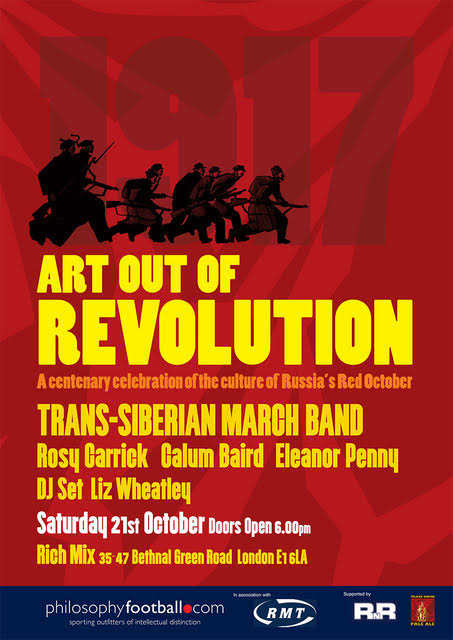
So a century on, how to celebrate 1917? It would be nice to get it right, after all precious few of us are going to be around for the bicentenary! The imperative of revolutionary change, notwithstanding this conjuncture or that, remains unchanged, and thus makes the best starting point. A notion summed up best by the title John Reed’s epic account of October 1917, Ten Days that Shook the World. An ideal so good that neither Hollywood nor Warren Beatty were able to destroy the message and instead produced a rather decent film version, Reds.
1917 served to inspire across the entire spectrum of the arts. Music, poetry, architecture, design, theatre, fashion, literature, film, has there ever been such a moment where art was shaped out of revolution of such a range and on such a scale? A revolutionary imperative that not only inspired, but recognised that to flourish these artists, writers, designers, poets would need the space to express this imperative in their own terms, not as servants of the revolution but in its service.
This first made sense to me in the mid 1980s, when the Crafts Council hosted a London exhibition ‘ Art into Production: Soviet Textiles, Fashion and Ceramics, 1917-1935’. The vivid colours, the variety of shapes, the ever-presence of a sense of movement with a purpose caught my eye and I’ve never forgotten it. Shortly after and the era of Gorbachev, Glasnost and Perestroika meant a much wider re-assessment of Soviet power on the world stage, the beginning of the end of what had threatened to become a new cold war. And this was reflected too in a popular appropriation of ‘Bolshevik chic’. Harmless enough in intent, broadly well-meaning but pretty much devoid of political content, there goes that conjuncture again.
And so where do we end up for October 2017? In post-Soviet Russia Putin will seek no doubt to represent 1917 as indicative of the might of his Greater Russia nationalism, this was the era of the USSR after all, a nation on a scale that Putin today can only dream of. Meanwhile across what used to be thought of as the West parties of social democracy are suffering a phenomenon the writer and activist James Doran has described as Pasokification. A steep decline in support following these parties’ embrace of the neoliberal consensus, in Greece PASOK has suffered the steepest fall of all but elsewhere in France, Spain, the Netherlands, the Irish Republic social-democratic parties have not only declined but faced an insurgent challenge from their Left too. None of this amounts to 1917 revisited but chimes nonetheless with the inspirational motives of radical change.
In Britain the picture is different. Because the insurgency has come from within the party of social democracy itself, the rank outsider, the serial rebel, Jeremy Corbyn. Labour of course is not about to become a revolutionary party, it has never been one and will never turn into one. But the sense that a party set on winning parliamentary power can co-exist with the ambition of reinventing itself as a social movement is increasingly prevalent as the defining characteristic of Corbynism. 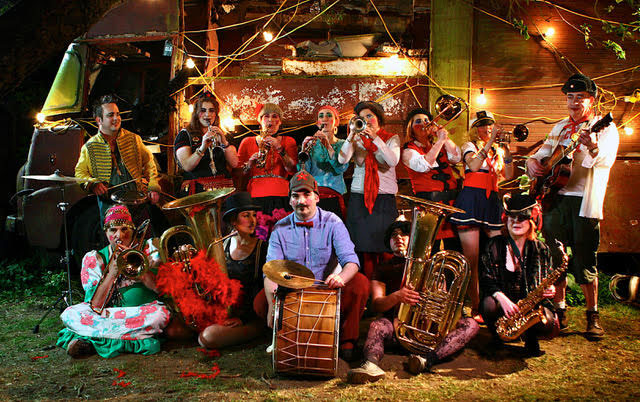
Finding a way to mix all this together for a 1917 centenary night out is no mean feat. But Philosophy Football, with the help of the RMT, are doing that at London’s Rich Mix Arts Centre on Saturday 21st October. Described by Time Out as ‘The Sex Pistols of Balkan Brass’ The Trans-Siberian March band headline with a special Shostakovitch inspired set. Michael Rosen reviews how 1917 produced a wave of childrens books at the time. Rosy Carrick performs extracts and interpretations of the brand new translation of Mayakovsky’s epic poem Lenin she has recently edited. And the surprise hit of the Edinburgh fringe Des Kapital, recalls the events of the Russian Revolution via the songs of Taylor Swift, Katy Perry and Robbie Williams, a history lesson like none other complete with audience singalongs! Add author of Landscapes of Communism, Owen Hatherley and Eldina Begic creator of the Comradettes clothing project with Richard Seymour author of Corbyn: The Strange Rebirth of Radical Politics on the spirit of revolution and be prepared to expect the unexpected.
There will be others who will debate the ins and outs of 1917 and all that what was to be done. That is right and proper, but the road to revolution needs its dancing shoes as well as marching boots. 1917? Ain’t nothing but a party.
Art out of Revolution is at Rich Mix, East London Saturday 21st October. Tickets from here
Sicily Unlimited
14.09.17
Former Philosophy Football FC 'Gaffer ' Geoff Andrews has set up a network of study tours to explore Sicily’s rich culture. His latest idea is to join with Philosophy Football in opposing commercialised tourism.
I used to spend a couple of weeks a year tutoring on Open University summer schools, the most rewarding teaching environment I have ever experienced. Sadly the OU don't do these schools anymore but I was keen to continue the idea, talking about Sicilian history, film and food, which I had picked up travelling and writing about Italy over the past decade. In addition, running Philosophy Football FC had brought home the simple pleasutes of the beautiful game in contrast to the power of big companies. Happily I can now bring these two experiences together in a way which celebrates culture for the non-conformist traveller.
Sicily is being rediscovered by the British. Once popular with Victorian and Edwardian travellers on pilgrimages, seeking convalescence or on a ‘Grand Tour’ of another ‘exotic’ culture, today it appeals to a new cohort of Brits. Perhaps tiring of ‘Chiantishire’ and persuaded by the charm and scenery of the Inspector Montalbano series on BBC4, increasing numbers of discerning travellers are making their way south. But what do they find when they get there?
It is a poor island economically, not only in comparison to Italy’s more affluent north but by wider European standards. It still suffers from poverty, unemployment and organised crime, while it has carried a large economic burden as one of the main arrival-points for migrants from North Africa. Yet it is extraordinarily rich in culture, with its unique and complex history of being dominated by different powers evident in its Greek temples, Norman castles, Baroque architecture and, of course, its food, which varies wildly right across the island. It was the home of some Italy’s most distinguished writers, including Giuseppe Tomasi di Lampedusa, the author of The Leopard, whose ‘Gattopardism’ (‘If we want things to stay as they are, things will have to change’) still helps explain political inertia; Leonardo Sciascia, whose novels on the search for truth and justice in the face of Sicily’s problems helped bring the mafia to serious public attention, and the feminist writer Dacia Maraini, brought up in Bagheria, near Palermo. The playwright Luigi Pirandello, who might be considered one of the first to portray ‘post-truth’, was from Agrigento, in an area now categorised as the ‘strada dei scrittori’, a land famous for its writers. Sciascia and Andrea Camilleri, the author of the Montalbano novels (and it is best to read the books in advance of the TV series), are both from the wider province. Some classic Italian films, among them Cinema Paradiso and Il Postino as well as classic neo-realist ones, Stromboli and La Terra Trema, were set on the island. Taormina, Sicily’s top tourist venue, perched high over the Ionian Sea, with its wonderful Greek theatre in the shadow of Mount Etna, an active volcano, was once a haven for writers, including D.H.Lawrence and Truman Capote. 
But what is the best way of exploring Sicily? Sicily’s unique history and contemporary predicament – rich in culture, relatively poor economically – makes it ideal for sustainable tourism. If you want a laid-on corporate experience, then it is not for you. Yet, the quality of the accommodation in agriturismi, (basically, family-owned ‘farm hotels’, often of 5 star quality), the food – an endless menu from streetfood arancini and panelle, to many varieties of fish, fruit and vegetables – and the renowned Etna wines, would put to shame much of what is counted as ‘luxury’ in today’s elite tourism. Sicily is famous for its hospitality where visitors are often regarded as guests rather than tourists.
Recent years have brought a new generation unwilling to wield to past problems and restraints. For example, there has been an open challenge to the power of the mafia by groups like Libera Terra, which produces and sells quality olive oil and wine on land confiscated from the mafia, and Addio Pizzo, which says ‘goodbye’ to protection money by increasing visible resistance and selling items produced by victims of mafia violence who suffered because they refused to pay it.
Sicily Unlimited was set up to explore this rich culture and work with local associations to help promote a sustainable vision of the island. Each year, we offer summer and Easter courses on Sicilian history, film and food, taught by myself, awriter and historian, and the London-based Sicilian journalist Francesca Marchese. We stay on an agriturismo and collaborate with groups like FAI (the Italian National Trust) and Slow Food, in order to bring local knowledge and experience to the course. In the Kolymbethra Gardens in Agrigento’s Valley of the Temples, for example, FAI has done magnificent work in restoring an abandoned area of outstanding natural beauty. Nearby, at the Scala dei Turchi (Turkish Steps), a familiar site in the Inspector Montalbano series, it has led a successful campaign to remove illegally-built eyesore buildings which threaten the environmental heritage of a UNESCO protected space. In Sicily Slow Food has been a grassroots movement which has done much to get just pay for small producers, defend traditional foods at risk, promote ‘eco-gastronomy’ and celebrate the simple pleasures of eating local food in a period which has seen the inexorable rise of global fast food corporations. The film and food week we organise on the Aeolian Islands in May combines visits to film locations with tastings of local food and wine during ‘Salina Isola Slow’, a Slow Food weekend.
Sicily Unlimited shares a similar outlook to Philosophy Football in promoting alternatives to corporate culture, offering a different idea of ethical consumption and working with a range of progressive organisations. In this light we are delighted to offer a 15% discount off the fees of our courses together with a free Philosophy Football shirt of your choice if you join us in Sicily. For details and bookings for next year’s Easter trip to Etna, Catania and Taormina and the Salina film and food trip please visit Siciliy Unlimited you can also email us here.
Geoff Andrews is a writer and historian, specialisiing in twentieth century British and Italian politics and culture. His latest book, The Shadow Man, was a biography of the communist intellectual James Klugman. His next book will look at the so-called 'fifth man' of the Cambride spy circle, John Cairncross. You can follow Geoff on twitter @andrewsgeoffand Siciiy Unlimited @siciliyunlimited
- The Death of Innocence
27.12.25 - Thatcherism Today
04.10.25 - Top Ten Books to Understand Labour Conference
26.09.25





